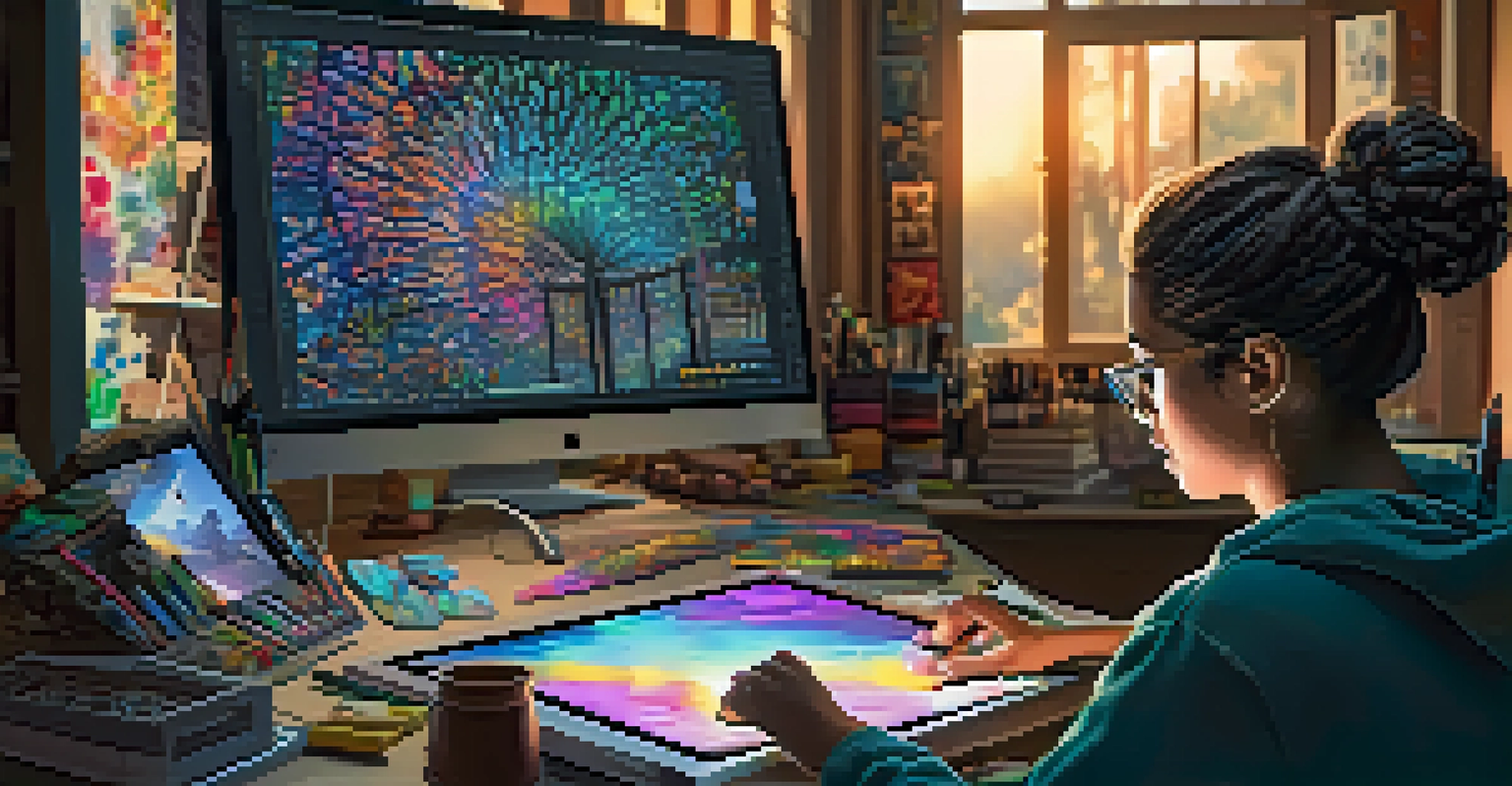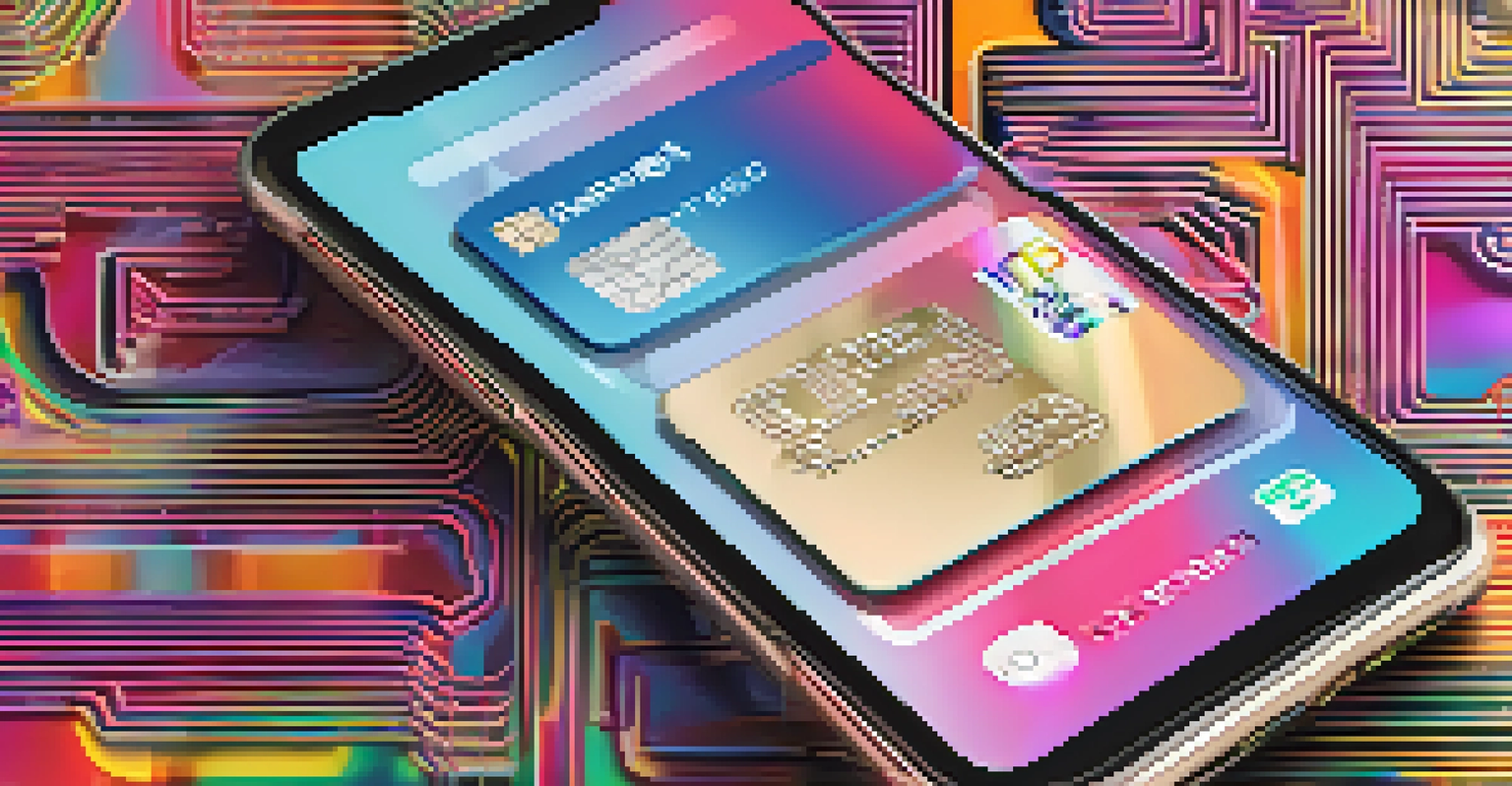NFTs as Digital Certificates: Ensuring Authenticity and Rights

What Are NFTs and Why Do They Matter?
NFTs, or non-fungible tokens, are unique digital assets that represent ownership of a specific item or piece of content, like art or music. Unlike cryptocurrencies such as Bitcoin, which are interchangeable, each NFT has distinct information that makes it one-of-a-kind. This uniqueness is crucial for ensuring authenticity, especially in a world flooded with digital reproductions.
NFTs have the potential to redefine the way we think about ownership and authenticity in the digital age.
Imagine a signed first edition of a book versus a mass-produced copy; the former holds intrinsic value due to its uniqueness and provenance. Similarly, NFTs provide a way to verify ownership and authenticity in the digital realm. This is particularly important as the digital landscape continues to expand, raising questions about originality and rights.
As we delve deeper into the world of digital ownership, understanding NFTs becomes essential. They not only represent a new form of asset but also a shift in how we think about value and authenticity online.
How NFTs Ensure Authenticity in Digital Assets
The core feature of NFTs is their ability to be traced back to the original creator, thanks to blockchain technology. Each NFT is recorded on a blockchain, providing a transparent, immutable ledger of ownership. This means that anyone can verify the authenticity of an NFT by checking its transaction history, much like how one might verify the provenance of a physical artwork.

For example, if you're purchasing a digital artwork, you can see who created it, who has owned it previously, and how much it has sold for in the past. This level of transparency helps build trust in the digital market, where counterfeits and piracy can be rampant. By verifying authenticity, NFTs help ensure that creators receive credit and compensation for their work.
NFTs Verify Digital Ownership
NFTs provide a unique way to establish and verify ownership of digital assets through blockchain technology.
In essence, NFTs act like a digital certificate of authenticity, offering buyers peace of mind that they're investing in genuine items rather than replicas. This is particularly valuable in industries such as art, music, and collectibles, where originality is paramount.
The Role of Smart Contracts in NFTs
At the heart of NFTs are smart contracts, which are self-executing contracts with the terms of the agreement directly written into code. These contracts automatically enforce the rules of ownership and rights associated with an NFT. For instance, when an NFT is sold, the smart contract ensures that the original creator receives a percentage of the sale, a feature that traditional art sales often lack.
The blockchain is the ultimate proof of authenticity.
This structure not only protects the creator's rights but also enables a more equitable distribution of profits. Imagine an artist selling a piece of art for $1,000 and receiving a percentage every time that piece is resold. This ongoing revenue stream is revolutionary for creators, allowing them to benefit from their work in the long term.
By incorporating smart contracts, NFTs provide a layer of security and trust that traditional ownership models often struggle to achieve. This makes them an appealing option for both creators and collectors looking to navigate the digital landscape.
Ownership Rights and NFTs: What You Need to Know
Owning an NFT does not always equate to owning the copyright of the associated digital asset. While the NFT itself proves ownership of the token, the rights granted to the owner can vary significantly. It's essential to understand what rights come with your NFT purchase, as some may include full usage rights, while others may only grant limited rights for personal use.
For example, purchasing an NFT of a digital painting might allow you to display it in your virtual gallery, but it may not give you the right to reproduce it on merchandise. This distinction is crucial for buyers to consider, as it can affect the value and utility of the NFT in the long run. Always read the terms associated with the NFT to understand your rights.
Smart Contracts Protect Creators
Smart contracts ensure that creators receive ongoing compensation from resale, transforming the economics of digital art and collectibles.
As the NFT market evolves, so too does the conversation around ownership rights. Clearer guidelines and regulations are needed to protect both buyers and creators in this rapidly changing landscape.
Challenges and Concerns Regarding NFT Authenticity
Despite their promise, NFTs are not without challenges. Issues such as copyright infringement and scams have emerged, raising concerns about the authenticity of some NFTs in the market. For instance, individuals have been known to mint NFTs of artworks they do not own, leading to legal disputes and financial losses for unsuspecting buyers.
As with any new technology, the NFT space requires vigilance and due diligence. Prospective buyers should research the creators and platforms involved before making a purchase. Just like buying art from a reputable gallery, ensuring that you are dealing with trustworthy sources is vital in the NFT market.
These challenges highlight the need for better education and transparency in the NFT ecosystem. As the market matures, improved practices and standards will be essential for fostering trust and ensuring that NFTs can fulfill their promise as authentic digital certificates.
The Future of NFTs as Digital Certificates
Looking ahead, the potential for NFTs to serve as digital certificates is immense. As industries like fashion, music, and gaming continue to adopt NFT technology, their role in proving authenticity and ownership will likely expand. Think about how tickets to events could be secured as NFTs, ensuring that they are genuine and potentially allowing for resale without the risk of fraud.
Moreover, as regulations evolve, we may see more standardized practices regarding ownership rights and authenticity verification. This could lead to greater acceptance of NFTs among mainstream consumers and businesses alike. Just as we have come to trust digital signatures and electronic contracts, NFTs might become a norm in verifying ownership and rights.
Understanding Rights is Crucial
Owning an NFT does not always grant copyright; buyers must understand the specific rights that accompany their purchase.
Ultimately, the future holds exciting possibilities for NFTs to redefine how we think about ownership and authenticity in the digital age. It’s an evolving landscape that invites both innovators and consumers to participate in shaping its direction.
Conclusion: Embracing NFTs for Authenticity and Rights
NFTs represent a significant shift in how we perceive and manage ownership in the digital world. By providing a secure way to verify authenticity and rights through blockchain technology and smart contracts, they are paving the way for a new era of digital assets. For creators, this means better protection and compensation, while for buyers, it offers a trustworthy method to own unique digital items.
As we navigate this evolving landscape, it’s crucial to stay informed and approach NFT purchases with care. Understanding what you’re buying and the associated rights can make all the difference in your experience. Just like any other investment, knowledge is power in the world of NFTs.

In conclusion, embracing NFTs as digital certificates can enhance our digital experiences, providing both authenticity and security in an increasingly online world. As we continue to explore their potential, one thing is clear: NFTs are here to stay, and their impact will only grow.